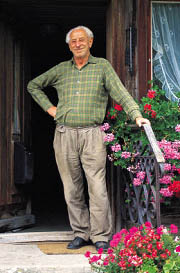In their book, When Your Father Dies, Dave Veerman and Bruce Barton map out the behind-the-scenes processing that a man experiences when his father dies. Neither author fully grasped the pain and anguish associated with “father loss” until their dads passed on.
 In interviews with men, they found a flood of turmoil often followed a father’s death. The ways of responding included: missing the one who cheered you on, feeling alone and vulnerable, receiving your father’s mantle, experiencing emotional waves, and recognizing what you’ve received and what you can pass on.
In interviews with men, they found a flood of turmoil often followed a father’s death. The ways of responding included: missing the one who cheered you on, feeling alone and vulnerable, receiving your father’s mantle, experiencing emotional waves, and recognizing what you’ve received and what you can pass on.
The essence of their findings echo what we’ve found in our own research here at the Center. Additionally, men who have reasonably good relationships with their fathers will experience a significant drop in their own fathering satisfaction when their fathers die.
This drop is explained by many factors, including: the realization that they are now the head of their clan, the loss of a key supporter, and a more serious and sober commitment to their own family. For men who had a strained relationship with their father, it’s important for them to process any unresolved issues they may have—addressing both joys and regrets in those relationships.
Veerman and Barton conclude that “father loss” is so experientially based that, until it happens to you, it’s likely you won’t understand what is happening to others when their father passes on.
Dave Veerman and Bruce Barton are lifelong friends. They met in college and often spent time at each other’s homes. They have stayed close ever since. Dave writes,
When Bruce told me that his father had been hospitalized and wasn’t doing well, I was right there and could commiserate with him. And I was saddened because I knew [his dad,] Sam Barton. Then, when Bruce told me his father had died, I felt terrible and I expressed my sincere condolences.
But I didn’t attend the funeral. Why not? I can’t give a definitive answer, but I recall Bruce giving me permission not to … and I knew that he and his father had problems relating to each other … and I was pretty busy … and I sent a card and flowers — I had a number of reasons for not going.
Then, about a year later, my father died, and I became personally and painfully aware of the trauma of that experience. I also remember feeling so grateful for the relatives and friends who made the effort to come to the funeral. And I felt guilt and regret for having skipped the service for Bruce’s dad.
Nothing will help you appreciate an experience as much as going through it yourself. Moving beyond a mere intellectual concept or ideal, it becomes real. That’s what happens in marriage and in having and rearing children. And it happened when I lost Dad. In living those events, ideals crashed into reality. Thus, since my father’s death, I have been much more empathetic to other men going through that experience.
ACTION POINTS
- If your father or father figure has passed away, talk to your wife or a close friend about the range of emotions you experienced after his death.
- Send an encouraging note to a friend who has lost his or her father this past year.
- Talk to a close friend about how you’d like to be remembered by your children.
- Share a memory with your children about the way your father or father figure showed you he was your biggest fan.

